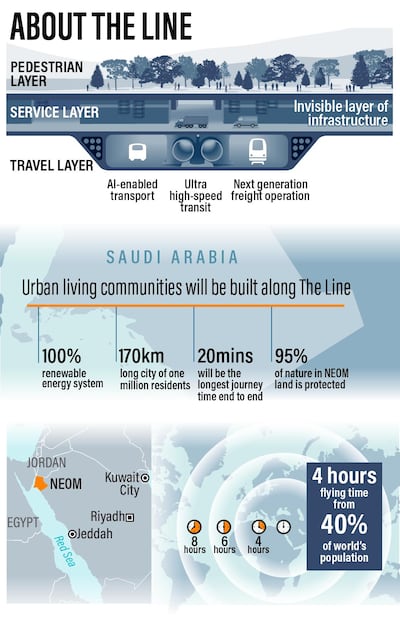Personalised meal plans based on your preferences and genetic profile, no queues, autonomous, carbon-free transport and robotic arms to help with mundane housework.
These are some of the visions of Joseph Bradley, the president of technology at Neom, Saudi Arabia's biggest and most ambitious development project.
"Today, we use words like 'smart cities'. And when you think about what that really means, you're describing a city that is very reactive," Mr Bradley told The National.
"But knowing what you are going to do is actually more valuable than what you do. The power of prediction creates new and exciting possibilities," he said in his first interview since Neom's chairman Crown Prince Mohammed bin Salman announced plans for The Line, the first residential scheme to be unveiled within the kingdom's $500 billion megaproject.
The Line is being built as a "living lab", with the aim of creating 380,000 jobs for people in high-tech and inventor roles.
The lab environment will be needed as some of Neom's biggest promises – like utility-scale hydrogen power, digital twins for every resident and autonomous transport – have yet to be realised all together and at a city-wide level anywhere on Earth.
Neom itself is already the site for some of this development.
Mr Bradley spoke from Neom, where he and 600 others live and work at what they call "base camp", gathering consumer insights and testing transport and communication tools that will one day be deployed across the 26,500 square-kilometre megacity.
Neom will take the notion of smart cities a step further since the modern concept tends not to be predictive, Mr Bradley said.
Instead, city services often respond based on "what's already occurring ... Neom goes from something that is reactive, to something that is proactive.
"It's looking into the future”, he adds.
He described a tourist arriving at Neom without having to stop at a passport checkpoint, baggage carousel or taxi stand. A visitor will step off the plane, be identified and checked into Neom through biometric identification like a retina scan or facial recognition. Their bags will be delivered to a hotel room that unlocks as the visitor approaches the door, having just stepped out of an autonomous taxi that was waiting at the airport curb to pick them up.
To identify what to build for residents and visitors of Neom, Mr Bradley said his team has developed a "listening infrastructure" through partnerships to understand students and workers in Riyadh and Jeddah, to collect data on what's important in the daily lives of those under-35 – a cohort that makes up about 70 per cent of Saudi Arabia's population.
A key component of the infrastructure that will be built in Neom is the use of digital twins for every resident, which will create a model of each individual based on their data – from their habits and patterns throughout the day, to facial recognition, their blood type and unique genetic sequence.
Digital twins will be used for everything from modelling traffic patterns to eliminate congestion to tailored health plans based on a person’s genetic sequence.
This level of data gathering will provide "a real live replica" of everyday life in Neom, which over time will allow city planners to predict and anticipate "what will happen in the future" using the digital twins.
The futuristic megaproject is one of several under way to establish growth sectors like tourism, alternative energy, real estate and technology under Saudi Arabia's Vision 2030 economic plan.
Last week, Prince Mohammed said the kingdom will offer $6 trillion worth of major opportunities to investors over the next decade, with the country expected to return to growth in 2021 following a contraction last year as a result of the pandemic.
Subscribe to Business Extra free to receive new episodes every week


